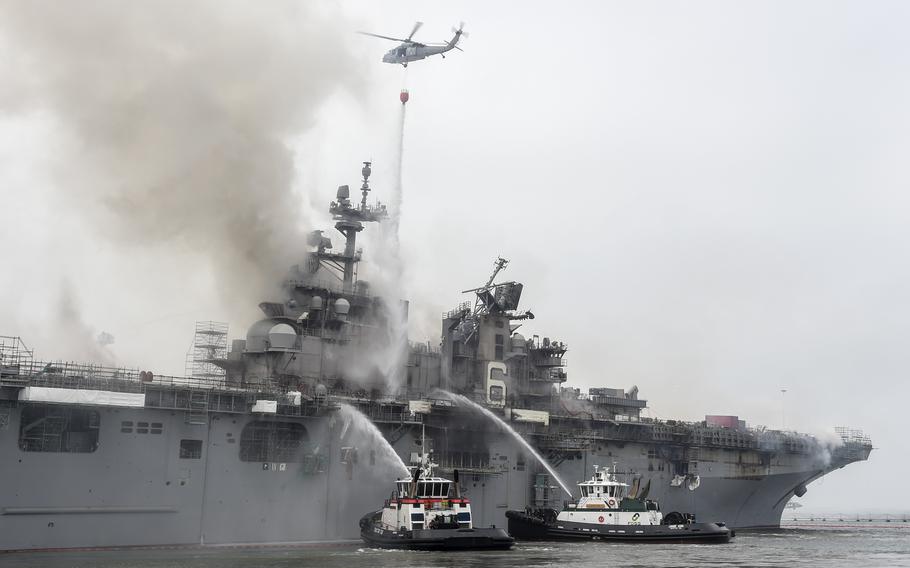
Firefighters extinguish a blaze aboard the amphibious assault ship USS Bonhomme Richard on July 13, 2020, a day after the fire broke out while the ship was moored at Naval Base San Diego. A recent Government Accountability Office study found that the Navy isn't reporting many ship fires that occur in port and doesn't have a system to learn lessons from fighting them. (Omar Powell/U.S. Navy)
Many fires that happen aboard Navy ships while they’re in port aren’t documented, leaving the service without an accurate idea of how widespread the problem is, a government watchdog agency found.
The reasons sailors aren’t noting fires vary, but a culture that discourages full compliance with reporting requirements was a factor, the Government Accountability Office said in a report released Thursday.
That underreporting “has given the Navy a false sense of security with fire incidents,” service officials told the GAO in the report.
The deficiency has been ongoing for years, auditors said. For example, a 2019 Navy study revealed that about 92% of all fire incidents that occurred in port in 2017 and 2018 weren’t listed in the Navy’s reporting system.
The findings were among several shortcomings cited in the GAO’s performance audit, which evaluated in-port fires on ships typically undergoing maintenance.
The November 2021 to April 2023 study also found that although the Navy was making improvements in collecting fire incident data, it had not analyzed the broad impact of fires on its operations. A single agency should be reviewing data on those impacts, the GAO recommended.
The Navy also doesn’t have a system for consistently collecting, analyzing and imparting lessons it should be learning from fighting fires, the report said.
This leaves the service vulnerable to repeating costly mistakes and makes another disaster like the loss of the amphibious assault ship USS Bonhomme Richard in July 2020 possible, the GAO said.
Bonhomme Richard was among 15 major fires on ships between May 2008 and July 2020 that caused an estimated $4 billion in damages, according to the report.
“As a result, the Navy has lost lessons learned over time — such as steps that a ship can take to improve fire safety,” the GAO said in its report.
The agency recommended that the Navy create a system that would consistently collect, analyze and share fire safety lessons.
The report also found that ships and commands were using different ways to report fires and not regularly using a required Naval Safety Command system. Near-miss events that could have resulted in injuries or other problems weren’t being reported, according to the study.
But auditors found that the Naval Safety Command system was cumbersome and slow, making it difficult to file reports. Those problems also were contributing to underreporting, according to the GAO.
The agency also pointed to poor safety training of maintenance personnel, who may not know when to report a fire, as well as inconsistencies in standards determining which fires should be reported. Nor has the service evaluated whether its firefighting training is effective, auditors said.
The report recommended that the Navy establish training goals and performance measures along with a process for monitoring and reporting related progress.